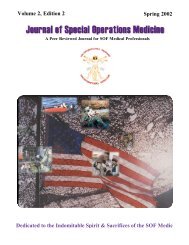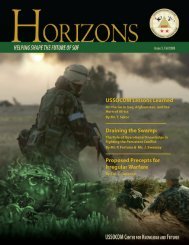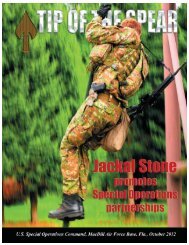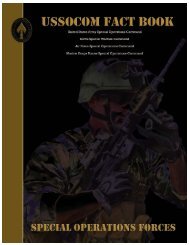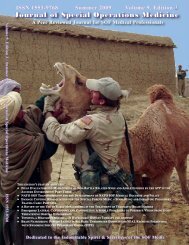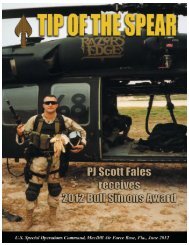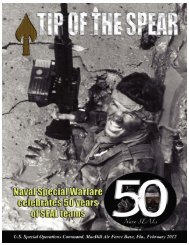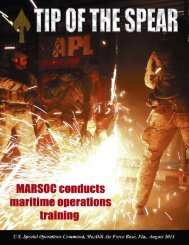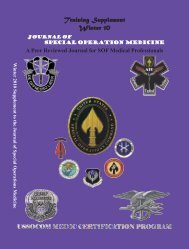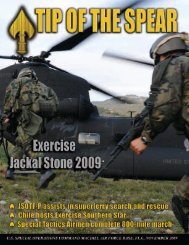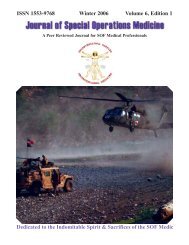Fall - United States Special Operations Command
Fall - United States Special Operations Command
Fall - United States Special Operations Command
Create successful ePaper yourself
Turn your PDF publications into a flip-book with our unique Google optimized e-Paper software.
Public Health Foodborne Illness Case Study<br />
During a <strong>Special</strong> <strong>Operations</strong> Forces<br />
Deployment to South America<br />
MAJ Michael McCown, DVM; SFC Benjamin Grzeszak, 18D<br />
ABSTRACT<br />
Although many public health articles have been published detailing foodborne illness outbreaks, a medical literature<br />
search revealed no articles that detail a case study or a specific response of a deployed U.S. military unit to a potential foodborne<br />
illness. This article describes a recent public health case study of a U.S. <strong>Special</strong> <strong>Operations</strong> Forces (SOF) team sickened while<br />
deployed to South America. It highlights public health factors which may affect U.S. personnel deployed or serving overseas<br />
and may serve as a guide for a deployed SOF medic to reference in response to a potential food- or waterborne illness outbreak.<br />
Methods: Eight food samples and five water samples were collected. The food samples were obtained from the host nation<br />
kitchen that provided food to the SOF team. The water samples were collected from the kitchen as well as from multiple sites<br />
on the host nation base. These samples were packaged in sterile containers, stored at appropriate temperatures, and submitted<br />
to a U.S. Army diagnostic laboratory for analysis. Results: Laboratory results confirmed the presence of elevated aerobic plate<br />
counts (APCs) in the food prepared by the host nation and consumed by the SOF team. Discussion: High APCs in food are the<br />
primary indicator of improper sanitation of food preparation surfaces and utensils. Conclusion: This case study concluded that<br />
poor kitchen sanitation, improper food storage, preparation, and/or holding were the probable conditions that led to the team’s<br />
symptoms.<br />
These results emphasize the importance of ensuring safe food and water for U.S. personnel serving overseas, especially<br />
in a deployment or combat setting. Contaminated food and/or water will negatively impact the health and availability of forces,<br />
which may lead to mission failure. The SOF medic must respond to potential outbreaks and be able to (1) critically inspect food<br />
preparation areas and accurately advise commanders in order to correct deficiencies and (2) perform food/water surveillance testing<br />
consistently throughout a deployment and at any time in response to a potential outbreak.<br />
INTRODUCTION<br />
The health of U.S. men and women is of the utmost<br />
importance to the success of U.S. missions abroad, as well as<br />
to national security. This case study focuses on specific public<br />
health factors that affect SOF health in a combat or noncombat<br />
overseas deployment setting. These lessons learned<br />
can apply to larger units and other U.S. agencies serving outside<br />
of the U.S. (e.g., U.S. State Department personnel at U.S.<br />
Embassies).<br />
Disease and Non-Battle Injury (DNBI) is an aspect of<br />
a unit’s deployment safety and health that must receive ongoing<br />
surveillance and have continuous preventive measures applied.<br />
The entire public health picture must be fully developed<br />
through the use of public health factors that may negatively<br />
impact force health. Such factors include infectious disease,<br />
zoonotic disease, environmental hazards, and food/water contamination,<br />
among many others.<br />
This article examines the unintentional contamination<br />
(e.g., bacterial, viral, chemical, etc.) of food and water, which<br />
leads to food/waterborne illness. The importance of food and<br />
water safety and quality assurance has been discussed previously<br />
in this Journal. 1 The SOF leadership, both command and<br />
medical, must emphasize the mandatory requirement of safe<br />
food and water procurement and use by forward deployed personnel.<br />
Procuring, storing, preparing, and holding safe food and<br />
water in a deployment setting is ensured through knowledgeable<br />
mission planning, education of team members, and surveillance<br />
testing in the field. The SOF medic must be the team’s<br />
food/water safety subject matter expert (SME). He or she must<br />
be ever vigilant and ensure the team employs preventive medicine<br />
countermeasures to prevent disease and illness. By using<br />
his food/water surveillance skill-set, he must be ever vigilant for<br />
a potential foodborne illness outbreak and then be able to act<br />
swiftly in response to an outbreak. This article presents a specific<br />
case of a SOF team sickened while deployed and describes<br />
techniques and procedures for the SOF medic to reference and<br />
apply in the future if presented with a similar situation.<br />
SITUATION<br />
An entire SOF team/element became intermittently and<br />
recurrently ill while deployed five months to South America.<br />
The team’s symptoms included intermittent nausea, vomiting,<br />
profuse watery diarrhea, stomach aches, malaise, mild dehydration,<br />
and headache. These symptoms recurred over the five<br />
month deployment and seemed to begin in the evenings hours,<br />
Public Health Foodborne Illness Case Study During a <strong>Special</strong> <strong>Operations</strong> Forces<br />
Deployment to South America<br />
45



